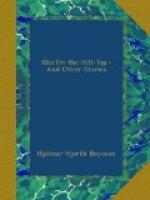“They are calling you, Jamie,” whispered Mabel.
“Calling me? Who?” said I.
“Up there in the tree. No, not there. It is down in the brook. Everywhere.”
“Oh,” cried I, with a forced laugh. “We are two great children, Mabel. It is nothing.”
Suddenly all was silent once more; but the wood-stars and violets at my feet gazed at me with such strange, wistful eyes, that I was almost frightened.
“You shouldn’t have done that, Jamie,” said Mabel. “You killed them.”
“Killed what?”
“The voices, the strange, small voices.”
“My dear girl,” said I, as I took Mabel’s hands and helped her to rise. “I am afraid we are both losing our senses. Come, let us go. The sun is already down. It must be after tea-time.”
“But you know we were talking about them,” whispered she, still with the same fascinated gaze in her eyes. “Ah, there, take care! Don’t step on that violet. Don’t you see how its mute eyes implore you to spare its life?”
“Yes, dear, I see,” answered I; and I drew Mabel’s arm through mine, and we hurried down the wood-path, not daring to look back, for we had both a feeling as if some one was walking close behind us, in our steps.
II.
It was a little after ten, I think, when I left the professor’s house, where I had been spending the evening, and started on my homeward way.
As I walked along the road the thought of Mabel haunted me. I wondered whether I ever should be a professor, like her father, and ended with concluding that the next best thing to being one’s self a professor would be to be a professor’s son-in-law. But, somehow, I wasn’t at all sure that Mabel cared anything about me.
“Things are not what they seem,” I murmured to myself, “and the real Mabel may be a very different creature from the Mabel whom I know.”




